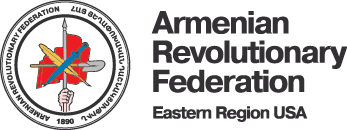Rostom Sarkissian Appointed Director of Development of EyeCare Project
Project Looks Forward to an Exciting Year of Development and Growth in Anticipation of 25th Anniversary
NEWPORT BEACH, Calif.—The Armenian EyeCare Project (AECP) recently announced the appointment of Rostom Sarkissian as the organization’s director of development.
Sarkissian is a Los Angeles-based public policy professional with more than 10 years of experience in campaigns, project management, non-profit development, and government and media relations. He holds a master’s degree in public policy from Harvard University’s Kennedy School of Government and a bachelor’s in diplomacy and world affairs from Occidental College. He served as a Coro Fellow in Pittsburgh, Pa., and is a two-time Richter Scholar who has conducted research about Armenia and Javakhk. Sarkissian is fluent in English and Armenian and also speaks Spanish.
“I am very excited to join the Armenian EyeCare Project as we work to fulfill our mission of eliminating preventable blindness in Armenia,” said Sarkissian. “I look forward to our 25th anniversary in 2017, and working with friends of the EyeCare Project throughout the United States and in Armenia to achieve our ‘Five for Five’ capital campaign goal to develop 5 Regional Eye Clinics across Armenia’s marzes in 5 years.”
The Regional Eye Clinics (REC) in Armenia will provide access to quality eye care in the regions of Armenia, including medical treatment, eye surgery, and laser treatment to all income groups. As the project implements the regional eye care system throughout Armenia, it will have the distinct advantage of a 24-year history working in Armenia and nearly 15 years of experience providing eye care in the remote regions of Armenia with the Mobile Eye Hospital. The project’s ability to leverage its long-time experience and relationships with the Armenian Ministry of Health, private physicians at the Malayan Eye Hospital and 8th Clinic Hospital, and USAID will be an enormous advantage as the five eye clinics are established.
Over the next five years the project will develop five RECs throughout Armenia, located in Ijevan in Tavush, Spitak in Lori, Kapan in Syunik, Yeghegnadzor in Vayots Dzor, and Gyumri in Shirak. The locations of these eye clinics will enable rural Armenians to have access to quality eye care and surgery within a reasonable distance. They will no longer have to travel to Yerevan for eye care or cataract surgery, or have to wait for two years for the Mobile Eye Hospital to visit their town.
“We welcome Rostom to our team,” said Roger Ohanesian, founder and chairman of the EyeCare Project. “Rostom’s active involvement in the Armenian community in Los Angeles and throughout the United States makes him a welcome addition to our team as we continue to expand our programs and develop our five Regional Eye Clinics in Armenia.”
Bringing accessible, quality eye care to the people of Tavush, the Armenian EyeCare Project opened its first Regional Eye Clinic, the Haig John Boyadjian AECP Regional Eye Clinic, located in Ijevan, last July in celebration of Haig’s life and with his brother, Peter Boyadjian, and many dignitaries in attendance. A second clinic, the John and Hasmik Mgrdichian AECP Regional Eye Clinic, located in Spitak, will open this year in July. The extraordinary support of these donors is testimony of their confidence in the work of the project and its eye care programs, which have treated more than 600,000 and restored the sight of 50,000 through cataract and other surgeries.
The Regional Eye Clinics will make an enormous difference in the lives of the people of Armenia, restoring the sight of thousands who today cannot afford cataract surgery or the trip to Yerevan for care. Cataract is the leading cause of blindness in the world and in Armenia. Today 91,000 Armenians or 30 percent of the population age 65 and over have cataracts in one or both eyes, causing partial or complete blindness. By 2050, a little more than 30 years from now, that number will more than double. Because cataract surgery is so limited in Armenia¾just 24 percent with cataracts have surgery¾most people go without care, leaving them visually disabled. In the United States people accept cataract surgery as a part of aging and it is a common procedure. Sadly, in Armenia, many have learned to accept blindness as a part of growing older because they have no access to care or cataract surgery.
The Armenian EyeCare Project’s vision for Armenia is a country where no individual is without access to quality eye care; where Armenian ophthalmologists are trained to diagnose and treat eye disease at the highest level—equal to United States standards and practices; and where preventable causes of blindness are eliminated through an emphasis on prevention and early intervention.
For more information about the Armenian EyeCare Project, contact the California office by calling (949) 933-4069, or visit www.eyecareproject.com. To make a donation, call the AECP or mail a check to P.O. Box 5630, Newport Beach, CA 92662.
Source: Armenian Weekly Mid-West
